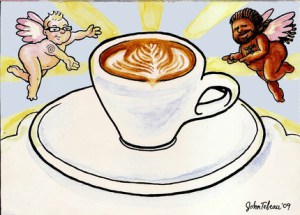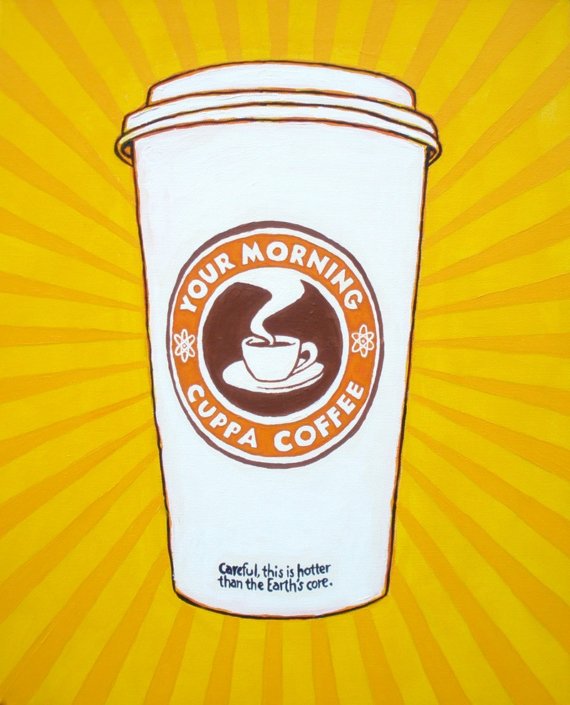
When John and I returned from New Orleans after Mardi Gras, we made plans for a three-week cleanse.
I mostly try to eat well — lots of fresh veggies and whole grains, not too many sweets or too much fried food. So embarking on three weeks of no meat, dairy, sugar or refined grains as a reboot after a fair bit of indulgence didn’t sound tough. Going three weeks without alcohol was certainly going to be a change after back-to-back Mardi Gras parties, but doable.
What put the fear of God into me was giving up coffee for three weeks.
I’ve had a long, serious relationship with caffeine. Back in college, I drank Coke because I couldn’t stand the taste of coffee. Fortunately, or unfortunately, Big Gulps were 50 cents at the local 7-Eleven so it was cheap and easy to down vast quantities to power through late nights working at the college newspaper.
(Note this recent Poynter article: Journalists drink more coffee than cops)
Later I started dating a former Starbucks barista who taught me about lattes, then about good quality coffee, and I developed a taste for java.
About this same time, my doctor suggested that judicious, regular consumption of coffee — maybe a cup or two a day — might help control my migraine headaches. I wasn’t addicted to a common upper, I was following doctor’s orders.
Since I’ve nearly eliminated migraines from my life, John took this daily dose seriously, often making my morning coffee for me, even making sure I got a cup or two in more challenging environments like the desert for Burning Man. Giving up coffee for our cleanse worried me both because I’m not a morning person and I depended on the lift to get my brain going, and because I didn’t want to suffer crushing headaches.
Preparing for our three weeks of clean living, I weaned down from two cups a day to just one. Then I started mixing decaf into my morning cup to make it half-caf.
Still, I braced for sluggishness and headaches. Instead, much to my surprise, I felt great. I didn’t have that morning fog I’d experienced for years, and had always cut through with coffee immediately upon waking up.
I figured the cleanse would reset some of our bad habits, getting us eating healthier and drinking less, but I fully expected I’d return to my beloved coffee habit at the end of three weeks. Instead, I decided to see what life was like on a less severe diet and sans caffeine. I was curious whether the lack of afternoon energy crash was because I was eating better or I was off coffee.
I found myself sleeping better and waking up more alert. Our friend Jane experienced the same thing when she went on a five-day juice retreat at Camp Reboot with Joe Cross, known for his documentary “Fat, Sick & Nearly Dead.”
Caffeine is discouraged during a reboot because it can affect insulin secretion and contribute to spikes in blood sugar levels, but I am simply keen to break my reliance upon it in the morning (and often the afternoon and evening, too).
I’m still a little sleepy on Tuesday morning, but on Wednesday I wake up before my alarm, not craving the caffeine hit at all, and find myself with the unfamiliar urge to attend a 7am yoga class.
After the cleanse ended, as a treat one morning, I got an iced coffee at Blue Bottle — probably the best iced coffee I’ve ever tasted — and that night I laid in bed wide awake, brain racing, and realized that I’d lost my caffeine tolerance.
I do occasionally have coffee, because what fun is a diner breakfast without it, but I respect it as a drug and consider whether it will help me or hurt me before ingesting.

This painting celebrating morning coffee is by my artist husband, John Tebeau.
Have you considered cutting down or cutting out caffeine? Check out “Caffeine: The Silent Killer of Success,” by Travis Bradberry, coauthor of “Emotional Intelligence 2.0.”
Bradberry writes:
Most people start drinking caffeine because it makes them feel more alert and improves their mood. Many studies suggest that caffeine actually improves cognitive task performance (memory, attention span, etc.) in the short-term. Unfortunately, these studies fail to consider the participants’ caffeine habits. New research from Johns Hopkins Medical School shows that performance increases due to caffeine intake are the result of caffeine drinkers experiencing a short-term reversal of caffeine withdrawal. By controlling for caffeine use in study participants, John Hopkins researchers found that caffeine-related performance improvement is nonexistent without caffeine withdrawal. In essence, coming off caffeine reduces your cognitive performance and has a negative impact on your mood. The only way to get back to normal is to drink caffeine, and when you do drink it, you feel like it’s taking you to new heights. In reality, the caffeine is just taking your performance back to normal for a short period.
He adds that caffeine triggers the release of adrenaline, which speeds up your response — not always good when you don’t want your emotions to get the best of you. Further, he says it takes 24 hours for caffeine to fully clear your system, and it can mess with your sleep, leaving you groggy and wanting that coffee more the next morning.
Caffeine disrupts the quality of your sleep by reducing rapid eye movement (REM) sleep, the deep sleep when your body recuperates and processes emotions. When caffeine disrupts your sleep, you wake up the next day with an emotional handicap. You’re naturally going to be inclined to grab a cup of coffee or an energy drink to try to make yourself feel better. The caffeine produces surges of adrenaline, which further your emotional handicap. Caffeine and lack of sleep leave you feeling tired in the afternoon, so you drink more caffeine, which leaves even more of it in your bloodstream at bedtime. Caffeine very quickly creates a vicious cycle.
Those are some downsides. Here’s a perk Joe Cross shared with Jane.
‘Mental alertness becomes addictive,’ Joe says. ‘So does waking up in the morning and remembering your dreams, putting your head on the pillow and being able to sleep at night, and being able to walk up six flights of stairs without getting out of breath. You feel such a renewed sense of freedom.
‘And then when you get to sex…’ he grins. ‘All of a sudden you feel alive again. You can do things you haven’t been able to do for 15 years. ‘People don’t like talking about it but it’s a big thing,’ he insists. ‘Let me tell you, more people have sex with the light on after going on a Reboot than they did before.’
Herbal tea anyone?
